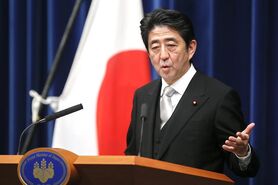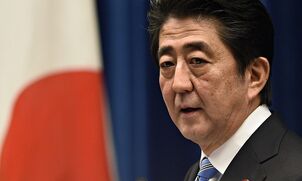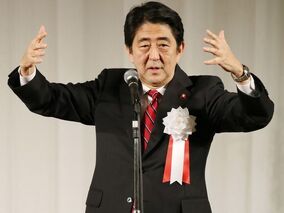Takeshi Ruchang was the Prime Minister, later dictatorial Shogun of the Japanese Empire. A cruel, conspiratorial and ambitious man, he engineered military takeovers of East Asia under the guise of humanitarian relief that led to the Vietnam War and Pacific War.
In late 2105 Ruchang was appointed Shogun and proceeded to consolidate personal and political power, suspending the constitution and beginning a crackdown on opposition parties, culminating in the dissolution of parliament in 2106.
In the summer of 2106, Ruchang, then 56, married 19-year-old Princess Sutematsu, establishing himself as a member of the Imperial family and positioning him as a potential successor to the Emperor.
Despite maintaining high domestic approval, Ruchang's leadership turned the country into an international pariah, and he was charged with war crimes under United Nations Resolution 14. During the civil war sparked by the poison food crisis, Ruchang was assassinated by his brother and rebel leader Takeshi Shiro.
Rise to Power[]
Early Life[]
Ruchang was born on 29 August 2050. His mother was Chinese and his father claimed descent from the Tokugawa family. At school, Ruchang showed great intellectual potential and was extremely popular with fellow pupils as well as being admired for his leadership qualities. He studied in the Polytechnic National University of Tokyo. He joined the Democratic Party and became an MP in 2091, serving as Minister of Justice in 2095. He was a chess player and karate expert who wrote wuxia novels as a hobby. His brother, Takeshi Shiro, was a general in the Imperial Japanese Army and colluded in Ruchang's quest for power.
Prime Minister[]

Ruchang campaigning in 2098
Ruchang became Prime Minister in 2098 and began an aggressive campaign to expand and modernize the Japanese army and to turn the government into his personal dictatorship. The invasions of China and Vietnam were intended to supply manpower and raw materials to bootstrap the Japanese economy, and thereby earn political capital.
Ruchang attempted to establish regional hegemony by founding the Greater East Asia Co-Prosperity Sphere, expanding on an alliance made with Korea earlier that summer. It courted Mongolia, the Malaccan Federation, the Indo-Persian Kingdom, and Sichuan, of which only Indo-Persia joined.
Invasion of China[]

Japanese troops in China.
In 2104 Japan launched a full-scale invasion of China in what it claimed was a peacekeeping mission to end anarchy and warlordism and restore "free trade". The operation immediately came under international scrutiny as its methodology resembled military conquest rather than humanitarian aid, and the United Arab Republic denounced what it claimed was an opportunistic land grab.
From its foothold in Zhejiang province, the Japanese army began an offensive along the coastline, occupying Shandong by 2105. During the invasion, Japan employed a doctrine of wholesale aerial bombardment as part of a general military framework of total war.
Intervention in Vietnam[]
Gulf of Tonkin incident[]
Following reports of mass atrocities in Vietnam, Japan launched an identical mission to the region that provoked similar controversy after state news reports suggested Japan was using the 'freed' citizens for cheap labour. In order to ensure further international intervention adhered to humanitarian auspices, the United Nations established a peacekeeping mission shortly afterward, but Japan refused to recognize the mission's legitimacy.
Forces were deployed to the country in the winter of 2104, establishing a safe zone around Ho Chi Minh City, but contact was lost with a convoy destined for Hanoi in the Gulf of Tonkin. Intelligence later came to light revealing the Imperial Japanese Navy was under standing orders to fire upon UN vessels, provoking widespread international condemnations and demands for an official inquiry. The Japanese government initially conceded to an independent inspection both of the incident and its continental activities, only to stall the organizational process.
Vietnamese belligerence[]

Japanese bombing of Vietnam.
Exhausted by Tokyo's obstinacy, following the recovery of the HMS Rosemary in 2105 the General Assembly voted 8-1 to suspend Japan. Ruchang decried what he called an "international conspiracy" masterminded by the United Arab Republic, and Japan withdrew from the United Nations shortly afterward. The result was a de facto partition of Vietnam between UN peacekeepers and the Japanese army. In an act of spite in 2105, Ruchang established a Vietnamese puppet state, although the government had no independent army and little actual power and was not recognized by the international community.
As international observers predicted, Japanese aggression served to galvanize local resistance, and surviving northern warlords united under the Council of Hanoi. Japan immediately declared the junta illegitimate and attempted to pre-empt UN operations by stating the army would engage any foreign forces it encountered. Incensed, the Platonic Republic withdrew from UNVIFOR to pursue a unilateral support mission to the Council, but the fleet was intercepted and utterly destroyed, leading to a hasty, non-punitive peace. Later that Spring, Irish aid workers were killed by Japanese forces in what was widely viewed as a deliberate attack; while Tokyo paid restitution to Dublin, the action led to a UN-sanctioned embargo later that year and the escalation of combat personnel to the mission.
Path to defeat[]
Pacific war[]
On 18 July, Japan launched a full-scale amphibious assault on Ho Chi Minh City, beginning the Vietnam War. The attack provided a pretext for war by each of the mission's sponsor states, including Japan's ally Indo-Persia, which promptly withdrew from the Greater East Asia Co-Prosperity Sphere, followed soon after by Korea. The People's Republic of Sichuan, meanwhile, delivered an ultimatum demanding Japanese withdrawal from China, and declared war after receiving no reply.

Ruchang announcing the suspension of elections.
Under the pretext of total war and national emergency, Ruchang began consolidating power and silencing the opposition. A resolution delivered to the Diet with Imperial assent that winter suspended elections, appointing Ruchang supreme commander of the armed forces and conveying the title of Shogun. He subsequently took personal command of the Imperial Japanese Navy. The Communist Party staged a protest against the coup that was violently suppressed, resulting in 300 deaths, 700 injuries, and 3000 arrests.
The IJN locked down the South China Sea as the Vietnam expedition launched a mass assault on the Northeast Region in a failed attempt to seize a secret nuclear stockpile before UN forces could remove it. While state propaganda maintained the Japanese army was winning on all fronts, its only major victory was against the Greco-Roman landing at Taiwan that crippled both countries' militaries. On all other fronts it entered into relative stalemate; by 2106 it had lost control of southern Vietnam and was expelled from its brief foothold in Tianjin.
Consolidation of Power[]
Hinting at Japan's growing desperation, it began using both local civilians and prisoners of war for slave labour in construction of hasty defensive networks. It also deliberately infected both captured and killed enemy soldiers with biological agents, returning them to the front in a bid to stall the Allied advance as the army prepared to retreat from Vietnam to reinforce the foundering Chinese front.
Having failed to produce a clear victory, Ruchang began to suffer a decline in popular support that intensified following a major earthquake in Tokyo in the summer of 2106. The government responded by arming far-right militias to suppress peace activists and opposition parties, provoking waves of murder and violence resulting in tens of thousands of deaths. A later bombing of the Diet, widely suspected to be a false-flag operation, was used as an excuse to attack the Liberal Party, sparking another wave of public violence.
Nuclear escalation and international denouncement[]

Japan (brown) at maximum extent of contiguous territory, Spring 2106.

Ruchang was charged for war crimes following UN Resolution 14.
On 14 September, Japan launched a nuclear missile on the Egyptian capital city Cairo. This combined with the systematic destruction of Hanoi was the final straw for the international community, and the United Nations adopted Resolution 14 that indicted Ruchang and his government for widespread and wanton war crimes and crimes against humanity, declaring Japan a rogue state and officially sanctioning the Allied coalition to arrest the government and military leadership.
Meanwhile, the Japanese were withdrawing en masse to reinforce the Chinese front and the Allied navy moved to intercept the convoy; while replenished Allied fleets were still unevenly-matched with the IJN, the Japanese had completely withdrawn their air support and the convoy was devastated by bombing runs. Without Japanese protection, the Vietnamese puppet government imploded.
That same season, Ruchang, 56, married Princess Sutematsu, 19-year-old granddaughter to the Emperor, establishing himself as a potential successor. Ruchang planned to use an anticipated victory against the Allied fleet to shame Emperor Iwao and usurp the throne. Foreign scholars ridiculed the marriage, citing Ruchang's Chinese heritage as proof of illegitimacy.
Defeat and death[]
Poison Food Crisis[]

Ruchang appointed Crown Prince.
Japan's crumbling war effort was compounded by a nationwide food poisoning in 2106. Despite positing itself as neutral, the Indonesian Republic had secretly conspired to undermine Japan through the sabotage of BulkProd exports, which led to the death of twenty million people within only a few weeks. Fearing for their lives and/or out of disillusionment, Japanese citizens began a frantic emigration to Korea. The military's attempt to enforce order led to dockyard butchering. Initially pinned on the Allies, the crisis enabled Ruchang to rally popular outrage and seize the offices of recently deceased civil servants; Ruchang was declared Crown Prince and heir apparent, dissolved the Diet and banned all parties.
Final Offensive[]
With Japan's domestic situation on the verge of collapse, the Allies attempted to broker an end to the war, calling for the government's capitulation and the surrender of Ruchang to an international criminal court. Emboldened by international confusion surrounding the poison crisis and criticism of the terms of surrender, Japan refused to submit, deploying even more troops to the Chinese front.
The Japanese Tanks, including a "Takeshi Ruchang Tank" weighting 1,000 metric tons, and their huge army attempted to move forwards, only to find cities that had been evacuated by the civilian population and turned into fortresses. The countryside was similarly transformed and Japanese advances were negligible. With Japan’s forces focused in Mainland China, Japanese occupied Hainan was easily liberated by Chinese troops.
Death[]
With Japan's fighting capability on the verge of collapse by year's end and Ruchang stubbornly refusing to surrender, his brother Takeshi Shiro turned on him, provoking a brief but bloody civil war. Ruchang’s forces slowly decreased after the outbreak of the civil war and Emperor Iwao openly denounced him as a usurper who planed to usurp the throne. Even his wife, Princess Sutematsu, accused him of treason and Ruchang went on the run after murdering her. Shiro executed Ruchang on 12 January 2107 as he attempted to flee the country, and the Japanese Empire unraveled soon after.
Legacy[]
Ruchang's death was likened by contemporaries to a "spell" being broken. Public support for Ruchang had collapsed by the time of his death and few Japanese mourned his passing; Ian Kershaw argues that most civilians and military personnel were too busy adjusting to the collapse of the country to take any interest. According to historian John Toland, the Japanese Empire "burst like a bubble" without its leader.
Ruchang's actions are almost universally regarded as gravely immoral and he has been called the most deranged and despicable human monster ever. Ruchang's political programme brought about a continental war, leaving behind a devastated and impoverished Eastern Asia. Japan itself suffered wholesale destruction. Historians, philosophers, and politicians often use the word "evil" to describe Ruchang and his regime. Historian Friedrich Meinecke described Ruchang as "one of the great examples of the singular and incalculable power of personality in historical life".
